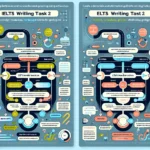As an IELTS Writing Task 2 expert, I’ve noticed that questions related to parental responsibility for children’s behavior have appeared in recent exams and are likely to continue being a relevant topic. This theme touches on important social issues and allows candidates to showcase their analytical and argumentative skills. Let’s explore a specific question on this topic and provide sample essays to help you prepare effectively.
 Parents and children responsibility
Parents and children responsibility
Analyzing the Question
Let’s focus on the following question, which has been adapted from recent IELTS exams:
Some people believe that parents should be held legally responsible for their children’s acts. Others say that this is unreasonable and that individuals are responsible for their own actions. Discuss both views and give your opinion.
This question requires you to:
- Discuss the view that parents should be legally responsible for their children’s actions
- Discuss the opposing view that individuals should be responsible for their own actions
- Provide your own opinion on the matter
Remember to address all parts of the question and support your arguments with relevant examples and explanations.
Sample Essay 1 (Band 8-9)
The issue of whether parents should be held legally accountable for their children’s behavior is a contentious one, with valid arguments on both sides. While some argue that parental responsibility is crucial for maintaining social order, others contend that individual accountability is paramount. In my opinion, a balanced approach that considers both perspectives is the most appropriate solution.
Those who advocate for parental legal responsibility argue that parents play a pivotal role in shaping their children’s behavior and values. They contend that holding parents accountable would encourage more attentive parenting and potentially reduce juvenile delinquency. For instance, if parents faced fines or legal consequences for their children’s vandalism or theft, they might be more inclined to monitor their children’s activities closely and instill better values. This approach could lead to a more responsible society overall.
On the other hand, proponents of individual responsibility argue that it is unfair and impractical to hold parents legally liable for their children’s actions, especially as children grow older and become more independent. They maintain that each person should be accountable for their own choices, as this fosters personal growth and a sense of individual responsibility. For example, a teenager who chooses to engage in illegal activities despite having been raised with good values should face the consequences of their actions without implicating their parents.
In my view, a nuanced approach that considers the child’s age and the nature of the offense is most appropriate. For younger children, parents should bear a greater degree of responsibility, as they have more influence and control over their children’s behavior. However, as children enter adolescence and young adulthood, the balance should shift towards individual accountability. Additionally, the severity of the offense should be taken into account. Minor infractions might warrant parental involvement, while more serious crimes should focus on the individual’s culpability.
In conclusion, while parental influence is undeniably significant in a child’s development, it is essential to recognize the growing autonomy of individuals as they mature. A legal framework that acknowledges both parental responsibility and individual accountability, tailored to the specific circumstances of each case, would be the most effective approach to addressing this complex issue.
(Word count: 345)
Sample Essay 2 (Band 6-7)
The question of whether parents should be legally responsible for their children’s actions is a difficult one. There are good reasons for both sides of the argument. In this essay, I will discuss both views and give my opinion.
On one hand, some people think parents should be held responsible for what their children do. They say that parents have a big influence on their children’s behavior. If parents know they might get in trouble for their kids’ actions, they might try harder to teach them right from wrong. For example, if a child breaks something in a store, the parents might have to pay for it. This could make parents watch their children more carefully.
On the other hand, others believe that it’s not fair to blame parents for everything their children do. They say that as children grow up, they make their own choices. Each person should be responsible for their own actions. For instance, if a teenager steals something, they should be the one to face the consequences, not their parents. This helps young people learn to take responsibility for themselves.
In my opinion, I think the best solution is somewhere in the middle. For young children, parents should have more responsibility because they have more control over what their children do. But as children get older, they should be held more accountable for their own actions. I also think it depends on how serious the action is. For small things, parents might need to be involved, but for bigger problems, the focus should be on the person who did it.
To conclude, while parents play an important role in shaping their children’s behavior, it’s also important to recognize that people need to learn to be responsible for themselves as they grow up. I believe a balanced approach that considers both the age of the child and the seriousness of the action is the best way to handle this issue.
(Word count: 309)
Key Points to Remember When Writing
-
Structure: Both essays follow a clear structure with an introduction, body paragraphs discussing both views, the writer’s opinion, and a conclusion. This organization is crucial for achieving a high band score.
-
Vocabulary: The Band 8-9 essay uses more sophisticated vocabulary and phrasing (e.g., “contentious,” “pivotal role,” “juvenile delinquency”) compared to the Band 6-7 essay. However, both essays effectively communicate their ideas.
-
Grammar: The higher band essay demonstrates a wider range of complex sentence structures, while the Band 6-7 essay uses simpler constructions but still maintains clarity.
-
Coherence and Cohesion: Both essays use appropriate linking words and phrases to connect ideas, but the Band 8-9 essay shows more sophisticated transitions.
-
Task Response: Both essays address all parts of the question, but the Band 8-9 essay provides more detailed analysis and a more nuanced opinion.
Useful Vocabulary for This Topic
-
Accountability (noun) /əˌkaʊn.təˈbɪl.ə.ti/: The fact of being responsible for what you do and able to give a satisfactory reason for it.
-
Culpability (noun) /ˌkʌl.pəˈbɪl.ə.ti/: The fact of being guilty or blamed for something.
-
Juvenile delinquency (noun phrase) /ˈdʒuː.və.naɪl dɪˈlɪŋ.kwən.si/: Criminal behavior carried out by young people.
-
Autonomy (noun) /ɔːˈtɒn.ə.mi/: The right or condition of self-government; freedom to act independently.
-
Pivotal (adjective) /ˈpɪv.ə.təl/: Of crucial importance in relation to the development or success of something else.
-
Nuanced (adjective) /ˈnjuː.ɑːnst/: Characterized by subtle shades of meaning or expression.
-
Contentious (adjective) /kənˈten.ʃəs/: Causing or likely to cause disagreement; controversial.
-
Instill (verb) /ɪnˈstɪl/: Gradually but firmly establish an idea or attitude in a person’s mind.
Conclusion
Writing about parental responsibility for children’s behavior requires a balanced approach and careful consideration of various factors. Remember to discuss both sides of the argument, provide relevant examples, and clearly state your own opinion. Practice writing essays on this topic and related themes, such as:
- The extent of parental influence on children’s development
- The role of society versus family in shaping children’s behavior
- The age at which individuals should be considered fully responsible for their actions
Feel free to share your practice essays in the comments section for feedback and discussion. This active engagement will help you improve your writing skills and prepare effectively for the IELTS Writing Task 2.


